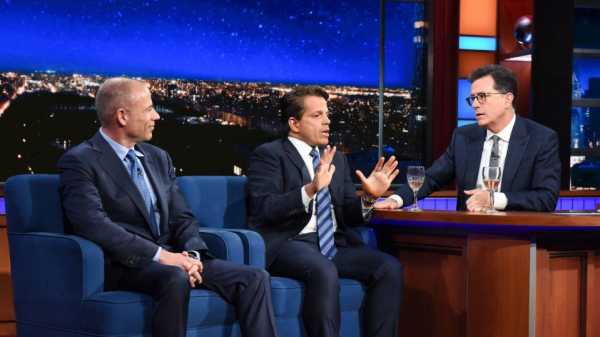
On Wednesday night, eager for a preview of public-affairs programming in the post-apocalypse, I switched on “The Late Show with Stephen Colbert,” which was débuting a double act. Michael Avenatti, the lawyer zealously representing Stormy Daniels, gained Colbert’s stage alongside Anthony Scaramucci, the banker who zestily represented President Trump, as White House communications director, for ten or eleven days last summer. Last month, the Times reported that a top talent agency had pitched networks a “Crossfire”-style series starring the pair. The “Colbert” appearance—“Talking Trump with the Mooch and Michael Avenatti,” a chyron read—was a pantomime of a duel flamboyantly waged with blunt objects.
They made the stage, and Colbert said, “My first question is: What? What—what is this? And my follow up is: Why is this?” This was the high point of the proceedings. The studio audience giggled to hear its loss for words succinctly articulated. The host began a steady descent into postures of elaborate frustration and indignity. The guests grinned semi-sheepishly, in the way of veteran camera hogs, and responded to Colbert’s question about the possibility that they might share a show by lofting some practiced shtick.
“I never do a show with a guy whose first name is ‘the,’ ” Avenatti said of the Mooch, who, while quietly relishing his cutie-pie nickname, promised an entertainment resembling “a male version of ‘Thelma & Louise.’ ” Colbert observed that the Trump administration is “certainly driving the country off a cliff right now.”
Playing off a passing comment, Colbert called for wine. A stagehand produced a bottle of lukewarm rosé, and I hoped the segment might achieve the in-vino-veritas splendor of Hoda and Kathie Lee communing with Bacchus on “Today.” How naïve of me! As Avenatti and Scaramucci fielded questions regarding the insipidity of Michael Cohen, the incompetence of Rudy Giuliani, and the narcissism of the President, they evinced no chemistry, thank God. The nature of the discussion, and of the discussants’ personae, meant that the chat could never in any way resemble a debate.
Avenatti, chomping out sound bites with the avidity that keeps cable-news bookers calling, spoke with a blaring voice of reason, occasionally punctuated with irrelevant boasts. (Lamenting the nonsense of Trump’s meeting with North Korea’s Kim Jong Un, Avenatti said, “I would have actually got a deal that mattered done,” rousing a few cheers from audience simply for deploying empty bluster to deride the Blusterer in Chief.) On the subject of Cohen, and of the troubles Trump would face in the event of his indictment, Avenatti said, “This is what happens when you trust your innermost secrets to a moron.” Addressing the same topic, Scaramucci said, “I don’t want to speculate” about the likelihood of Cohen’s indictment; he then proceeded to speculate about it, albeit in the most tepid and general terms. The Mooch, charting the difficult course of seeming hopeful about this Presidency without sounding like an outright cretin, demonstrated a tremendous aptitude for blandness. To his credit, his most memorable phrases involved the dropping of names, supplying evidence that he is so well connected that all television producers should be delighted to slather his banality across their airwaves.
Talk turned toward the Trump Tower meeting of June 9, 2016, and the Administration’s deceptions about it. Scaramucci insisted that the meeting “was about the child adoption situation.” Colbert, taken aback, reclined so deeply in his swivel chair that he seemed to melting out of it. Affronted, he called a lie a lie. Disgusted, he reached for the wine. What was this? It was a sideshow in the shadow of an emergency, a stab at comedy spun off from an escalating American tragedy.
Sourse: newyorker.com






